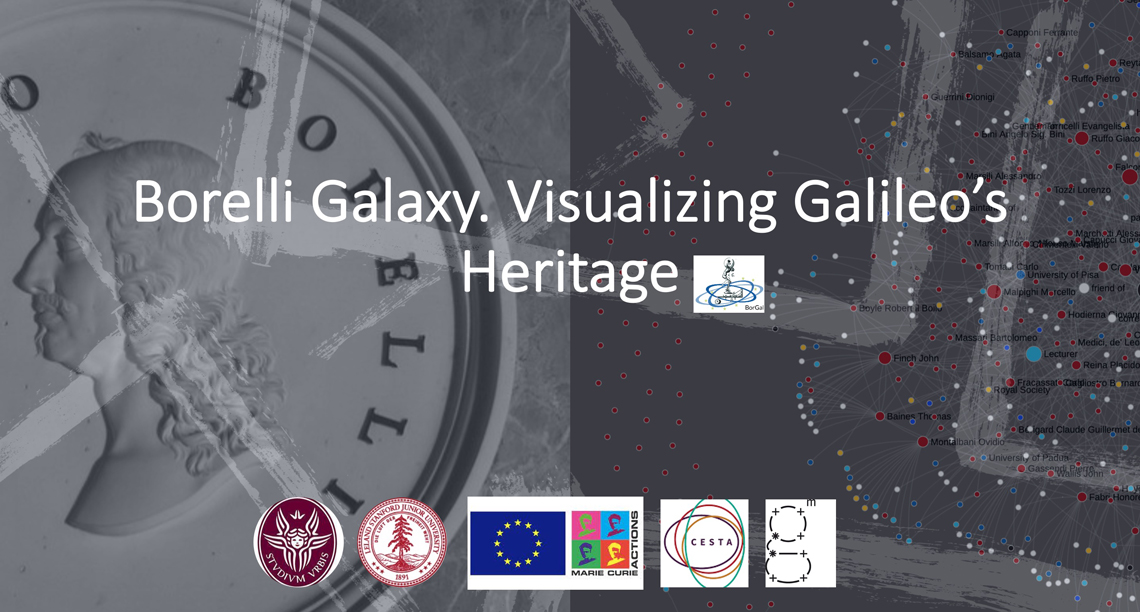MARIE CURIE 2017 - Progetto BorGal

BORGAL - Borelli Galaxy. Visualizing Galileo's Heritage
Researcher: Dr Federica Favino
Start date: 01-09-2018
End date: 16-10-2021
Projecr Number: BorGal received funds by the European Union’s Horizon 2020 research and innovation programme under the Marie Skłodowska-Curie grant agreement No 799769.
EU Funding: € 262.269,00
Partner institutions/supervisors. Sapienza University of Rome, Department of History, Anthropology, Religions, Art, and Performing Arts (Prof. Renata Ago); Stanford University, Department of History (Prof. Paula Findlen); Stanford Center for Spatial and Textual Analysis (CESTA) (Prof. Giovanna Ceserani); Museo Galileo, Florence.
The Project. BorGal focuses on the Italian physiologist, physicist, and mathematician Giovanni Alfonso Borelli (1608-1679), a leading figure among the natural philosophers belonging to ‘Galileo’s school’. He was the only one of his generation to adapt Galileo’s methodology – that is experimental practice and a mechanistic and geometrical epistemic model – to the different branches of scientific research; like Galileo’s, his experimentalism was based on a strong theoretical and even ‘ideological’ approach. BorGal aims at emphasizing Borelli’s role in the making of European scientific thought and community, by taking advantage of his still scattered correspondence. We have been working at recovering this corpus by merging metadata on published and unpublished letters, as well as on the epistles known only indirectly, and by processing the data they provide through Digital Humanities tools. Our final goal is to map, chart, ‘heuristically’ visualize and provide open access for scholars and the general public to the multi-layered and spatial dimensions of ‘Borelli’s galaxy’ (places, people, works, letters, instruments, objects, information…), as well as to the way ‘Galileo’s heritage’ took shape while circulating across the ‘Republic of Letters.
Dr. Federica Favino is Assistant Professor of History of Science at the Department of History Anthropology Religions Art and Performing Arts at Sapienza University of Rome. She holds a PhD from the University of Neaples Federico II with a research on the galilaean circles in Baroque Rome.
She is the recipient of numerous grants and fellowships: Mellon fellow at the Harvard University Center for studies on the Italian Renaissance Villa I Tatti, Marie Curie Intra-European fellow at the Centre Alexandre Koyré in Paris, Marie Curie reintegration grant fellow at the Department of History at Sapienza University; assistant research scholar at the Italian Academy for Advanced Studies at Columbia University. She is the author of numerous studies on scientific culture in Early modern and modern Rome, with a special focus on the world of the Curia, the Academies, the University and the religious orders. She is the author of La filosofia naturale di Giovanni Ciampoli (Florence, Olschki 2015); Donne e scienza nella Roma dell’Ottocento (Rome, Viella, 2020), and co-editor of Copernicus banned. The entangled matter of the anti-Copernican decree of 1616, Florence, Olschki, 2018, with Natacha Fabbri (https://uniroma.academia.edu/FedericaFavino).
